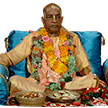Spiritual Knowledge - an essential subject: Difference between revisions
(Created page with "Category:Essential Subjects <!----------------------- edit below this line -----------------------> <!------------------------ begin introduction text --------------------...") |
(Vanibot #0041: Moves Choose Another box to the end) |
||
| Line 2: | Line 2: | ||
<!----------------------- edit below this line -----------------------> | <!----------------------- edit below this line -----------------------> | ||
<!------------------------ begin introduction text ------------------------> | <!------------------------ begin introduction text ------------------------> | ||
By chanting Hare Kṛṣṇa, the reservoir of misunderstanding will be cleared and then one can receive the spiritual knowledge. Without cleansing the heart it is very difficult to understand and receive spiritual knowledge. All these reformatory measures—brahmacārī, gṛhastha, vānaprastha—they are the cleansing method. Bhakti is also a cleansing method, vidhi-bhakti. The Kṛṣṇa consciousness movement is the gradual process to make one a qualified brāhmaṇa. When one becomes a brāhmaṇa, then he knows Brahman. Then he makes spiritual progress. Therefore, without becoming a brāhmaṇa nobody can make spiritual progress. That is the door of spiritual knowledge. | |||
Srila Prabhupada's books, lectures, conversations and letters offer a comprehensive presentation of this essential subject as seen in the '''[[Vaniquotes:Category:Spiritual Knowledge| | Srila Prabhupada's books, lectures, conversations and letters offer a comprehensive presentation of this essential subject as seen in the Vaniquotes '''[[Vaniquotes:Category:Spiritual Knowledge|Spiritual Knowledge]]''' category. An introduction from his books is given below in the following 16 quotes. | ||
<!-------- end introduction text and don't touch next three lines ---------> | <!-------- end introduction text and don't touch next three lines ---------> | ||
---- | ---- | ||
== Quotes from Srila Prabhupada's books == | == Quotes from Srila Prabhupada's books == | ||
<!----------------- edit quote boxes below this line -----------------> | <!----------------- edit quote boxes below this line -----------------> | ||
{{VaniQuotebox| | {{VaniQuotebox|The essence of spiritual knowledge is found in the pastimes of Sri Caitanya Mahaprabhu, which are identical with the pastimes of Lord Krsna. If knowledge does not include the understanding of Sri Caitanya Mahaprabhu and Krsna, it is simply superfluous|The essence of spiritual knowledge is found in the pastimes of Śrī Caitanya Mahāprabhu, which are identical with the pastimes of Lord Kṛṣṇa. This is the essence of knowledge. If knowledge does not include the understanding of Śrī Caitanya Mahāprabhu and Kṛṣṇa, it is simply superfluous. By Śrī Caitanya Mahāprabhu's grace, the nectar of Lord Śrī Kṛṣṇa's pastimes is flowing in different directions in hundreds and thousands of rivers. One should not think that the pastimes of Śrī Caitanya Mahāprabhu are different from Kṛṣṇa's pastimes. '''(Caitanya-caritāmṛta, Madhya-līlā 25.271)'''}} | ||
{{VaniQuotebox| | {{VaniQuotebox|Spiritual knowledge is realization of one's self as part of the Supreme Lord|Spiritual knowledge is realization of one's self as part of the Supreme Lord. When the self-realized spiritual soul is engaged in service to the Lord, he is eternally imperceptible and inconceivable. Thus established in spiritual knowledge, he is completely freed from material bondage. '''(Śrīmad-Bhāgavatam 9.7.25-26)'''}} | ||
{{VaniQuotebox| | {{VaniQuotebox|Spiritual knowledge is the main topic of the Vedas, but to help the human being's spiritual pursuit of knowledge, the other information, as above mentioned, forms necessary branches of the Vedic knowledge|Spiritual knowledge is the main topic of the Vedas, but to help the human being's spiritual pursuit of knowledge, the other information, as above mentioned, forms necessary branches of the Vedic knowledge. '''(Śrīmad-Bhāgavatam 3.12.38)'''}} | ||
{{VaniQuotebox| | {{VaniQuotebox|Spiritual knowledge means fully understanding the Absolute Truth in three features - impersonal Brahman, localized Paramatma and the all-powerful Supreme Personality of Godhead|Spiritual knowledge means fully understanding the Absolute Truth in three features—impersonal Brahman, localized Paramātmā and the all-powerful Supreme Personality of Godhead. '''(Caitanya-caritāmṛta, Madhya-līlā 25.103)'''}} | ||
{{VaniQuotebox| | {{VaniQuotebox|Spiritual knowledge must be developed by a combination of theoretical and practical knowledge, and that is the guaranteed way for attainment of spiritual perfection|Simple theoretical book knowledge is not sufficient for a neophyte devotee. Book knowledge is theoretical, whereas the arcana process is practical. Spiritual knowledge must be developed by a combination of theoretical and practical knowledge, and that is the guaranteed way for attainment of spiritual perfection. '''(Śrīmad-Bhāgavatam 2.3.22)'''}} | ||
{{VaniQuotebox| | {{VaniQuotebox|When that Supreme Godhead becomes the aim of one's life, one is said to have attained spiritual knowledge|The conception of God derived through the material senses is inaccurate because the Supreme Lord is beyond the material senses, but when one engages his senses in devotional service, the eternal Supreme Personality of Godhead is revealed on the platform of the soul. When that Supreme Godhead becomes the aim of one's life, one is said to have attained spiritual knowledge. '''(Śrīmad-Bhāgavatam 6.4 Summary)'''}} | ||
{{VaniQuotebox| | {{VaniQuotebox|When the self-realized spiritual soul is engaged in service to the Lord, he is eternally imperceptible and inconceivable. Thus established in spiritual knowledge, he is completely freed from material bondage|Spiritual knowledge is realization of one's self as part of the Supreme Lord. When the self-realized spiritual soul is engaged in service to the Lord, he is eternally imperceptible and inconceivable. Thus established in spiritual knowledge, he is completely freed from material bondage. '''(Śrīmad-Bhāgavatam 9.7.25-26)'''}} | ||
{{VaniQuotebox| | {{VaniQuotebox|Without realizing spiritual knowledge, one cannot understand that the transcendental form of the Lord is always beyond the creative energy|The Supreme Personality of Godhead is always transcendental to this material creation. Nārāyaṇaḥ paro ’vyaktāt: "Nārāyaṇa, the Supreme Personality of Godhead, is always transcendental." He is not a creation of this material world. Without realizing spiritual knowledge, one cannot understand that the transcendental form of the Lord is always beyond the creative energy. '''(Caitanya-caritāmṛta, Madhya-līlā 25.118)'''}} | ||
{{VaniQuotebox|The jnanis, by culture of brahma-vidya, spiritual knowledge, struggle very hard to get out of the clutches of material nature, but a devotee, by dint of his advancement in devotional service, automatically becomes detached from his material body|The jñānīs, by culture of brahma-vidyā, spiritual knowledge, struggle very hard to get out of the clutches of material nature, but a devotee, by dint of his advancement in devotional service, automatically becomes detached from his material body. When the devotee's spiritual body begins to manifest, he actually enters into his activities in transcendental life. '''(Śrīmad-Bhāgavatam 4.23.11)'''}} | |||
{{VaniQuotebox|The first instruction is that one should understand that the soul is within the body and is transmigrating from one body to another. This is the beginning of spiritual knowledge|The first instruction is that one should understand that the soul is within the body and is transmigrating from one body to another. This is the beginning of spiritual knowledge. Any person who is not expert in understanding this science or is unwilling to understand it remains in the bodily conception of life, or the animalistic conception of life, as confirmed in Śrīmad-Bhāgavatam (yasyātma-buddhiḥ kuṇape tri-dhātuke. .. sa eva go-kharaḥ. '''(Śrīmad-Bhāgavatam 7.7.21)'''}} | |||
{{VaniQuotebox|The culture of spiritual knowledge necessitates the help of the body and mind; therefore maintenance of the body and mind is required if we are to reach our goal|The culture of spiritual knowledge necessitates the help of the body and mind; therefore maintenance of the body and mind is required if we are to reach our goal. The normal temperature should be maintained at 98.6 degrees, and the great sages and saints of India have attempted to do this by a balanced program of spiritual and material knowledge. They never allow the misuse of human intelligence for diseased sense gratification. '''(Sri Isopaniṣad, Mantra 11)'''}} | |||
{{VaniQuotebox|The arguments offered by pure devotees to their disciples are so convincing that even a dull-headed disciple is immediately enlightened with spiritual knowledge|Association with pure devotees certainly frees one from the material clutches. This is certainly true of King Rahūgaṇa's association with Jaḍa Bharata. King Rahūgaṇa was immediately freed from the misgivings of material association. The arguments offered by pure devotees to their disciples are so convincing that even a dull-headed disciple is immediately enlightened with spiritual knowledge. '''(Śrīmad-Bhāgavatam 5.13.22)'''}} | |||
{{VaniQuotebox|The acarya enriches the disciple with full spiritual knowledge and thus awakens him to the activities of devotional service|The ācārya in the true sense of the term, who is authorized to deliver Kṛṣṇa, enriches the disciple with full spiritual knowledge and thus awakens him to the activities of devotional service. '''(Caitanya-caritāmṛta, Ādi-līlā 1.47)'''}} | |||
{{VaniQuotebox|Human life is the best opportunity for the culture of spiritual knowledge, and a human being who does not take advantage of this opportunity is called a naradhama, the lowest of human beings|The miseries of this material world serve to indirectly remind us of our incompatibility with dead matter. Intelligent living entities generally take note of these reminders and engage themselves in the culture of vidyā, or transcendental knowledge. Human life is the best opportunity for the culture of spiritual knowledge, and a human being who does not take advantage of this opportunity is called a narādhama, the lowest of human beings. '''(Sri Isopaniṣad, Mantra 11)'''}} | |||
{{VaniQuotebox|Generally one bequeaths all accumulated wealth to family & retires from family activities to progress in spiritual knowledge. However, we find the behavior of Rupa Gosvami to be exemplary; he gave fifty percent of his wealth for spiritual purposes|One's accumulated wealth may be divided into three parts for distribution, namely fifty percent for the service of the Lord, twenty-five percent for the family members and twenty-five percent for personal necessities. Spending fifty percent for the service of the Lord or for propagation of spiritual knowledge in society by way of the saṅkīrtana-yajña is the maximum display of human mercy. '''(Śrīmad-Bhāgavatam 1.17.42)'''}} | |||
{{VaniQuotebox|Generally householders think that engaging in family affairs is their prime duty and that self-realization or enlightenment in spiritual knowledge is secondary. Out of compassion only, saintly persons and brahmanas go to householders' homes|Generally householders think that engaging in family affairs is their prime duty and that self-realization or enlightenment in spiritual knowledge is secondary. Out of compassion only, saintly persons and brāhmaṇas go to householders' homes. '''(Kṛṣṇa Book, Chapter 8)'''}} | |||
<!----------------- edit quote boxes above this line -----------------> | <!----------------- edit quote boxes above this line -----------------> | ||
| Line 31: | Line 47: | ||
'''Spiritual Knowledge - [[Vaniquotes:Category:Spiritual Knowledge|explore more within this category]]'''. | '''Spiritual Knowledge - [[Vaniquotes:Category:Spiritual Knowledge|explore more within this category]]'''. | ||
{{EsentialSubjectTotal}} | |||
<div style="float:left;"> | |||
{{EssentialSubjectnav}} | |||
</div> | |||
__NOTOC__ | __NOTOC__ | ||
__NOEDITSECTION__ | __NOEDITSECTION__ | ||
Latest revision as of 17:43, 22 November 2020
By chanting Hare Kṛṣṇa, the reservoir of misunderstanding will be cleared and then one can receive the spiritual knowledge. Without cleansing the heart it is very difficult to understand and receive spiritual knowledge. All these reformatory measures—brahmacārī, gṛhastha, vānaprastha—they are the cleansing method. Bhakti is also a cleansing method, vidhi-bhakti. The Kṛṣṇa consciousness movement is the gradual process to make one a qualified brāhmaṇa. When one becomes a brāhmaṇa, then he knows Brahman. Then he makes spiritual progress. Therefore, without becoming a brāhmaṇa nobody can make spiritual progress. That is the door of spiritual knowledge.
Srila Prabhupada's books, lectures, conversations and letters offer a comprehensive presentation of this essential subject as seen in the Vaniquotes Spiritual Knowledge category. An introduction from his books is given below in the following 16 quotes.
Quotes from Srila Prabhupada's books
Spiritual Knowledge - explore more within this category.
Vanipedia has now over 903 introductory articles compiled from Srila Prabhupada's books under the series titled Essential Subjects. All these articles can be seen in the Table of Content on the right side of this article and also here in this Umbrella Category. Browse through them to relish the breadth and depth of Srila Prabhupada's teachings - There is a subject for everyone.













